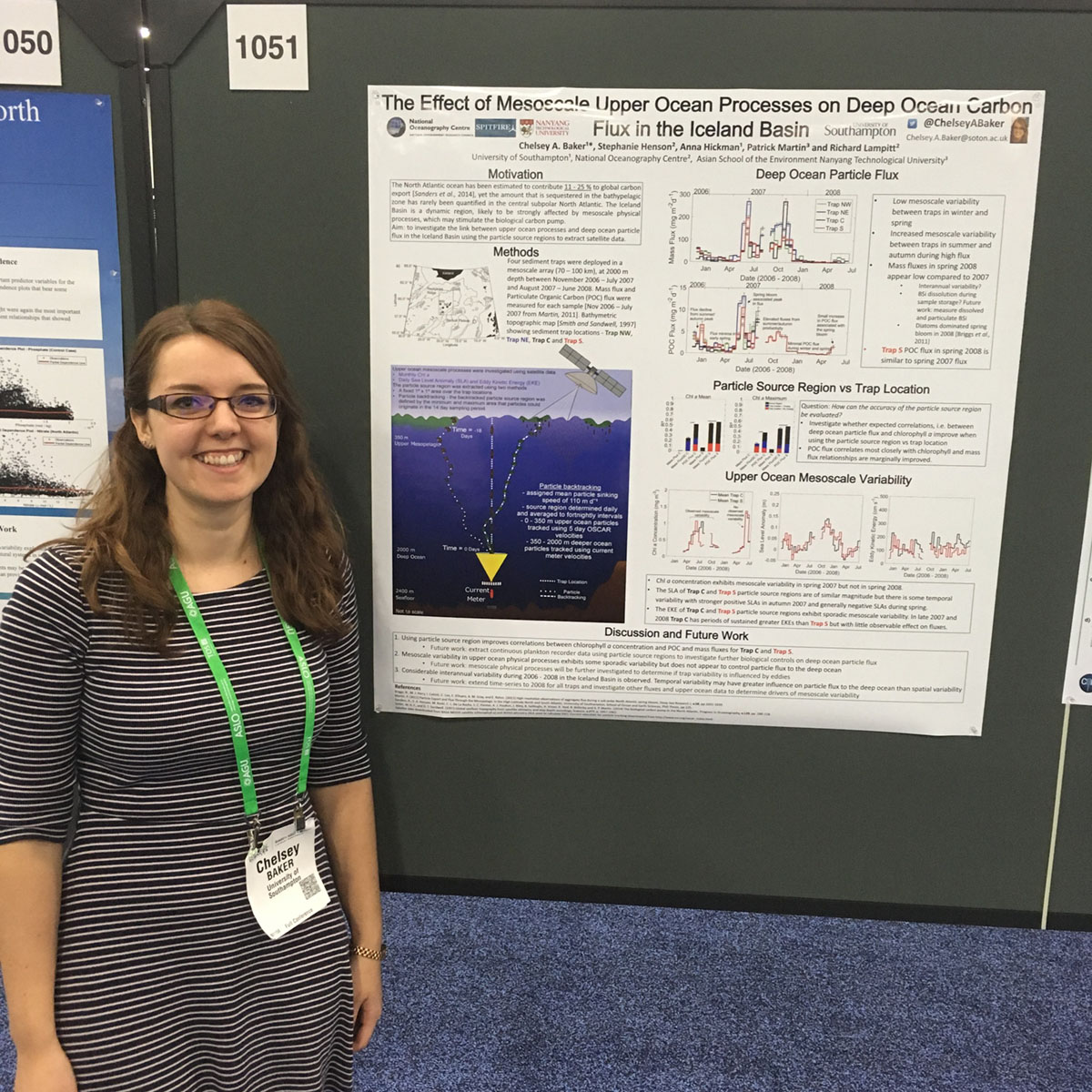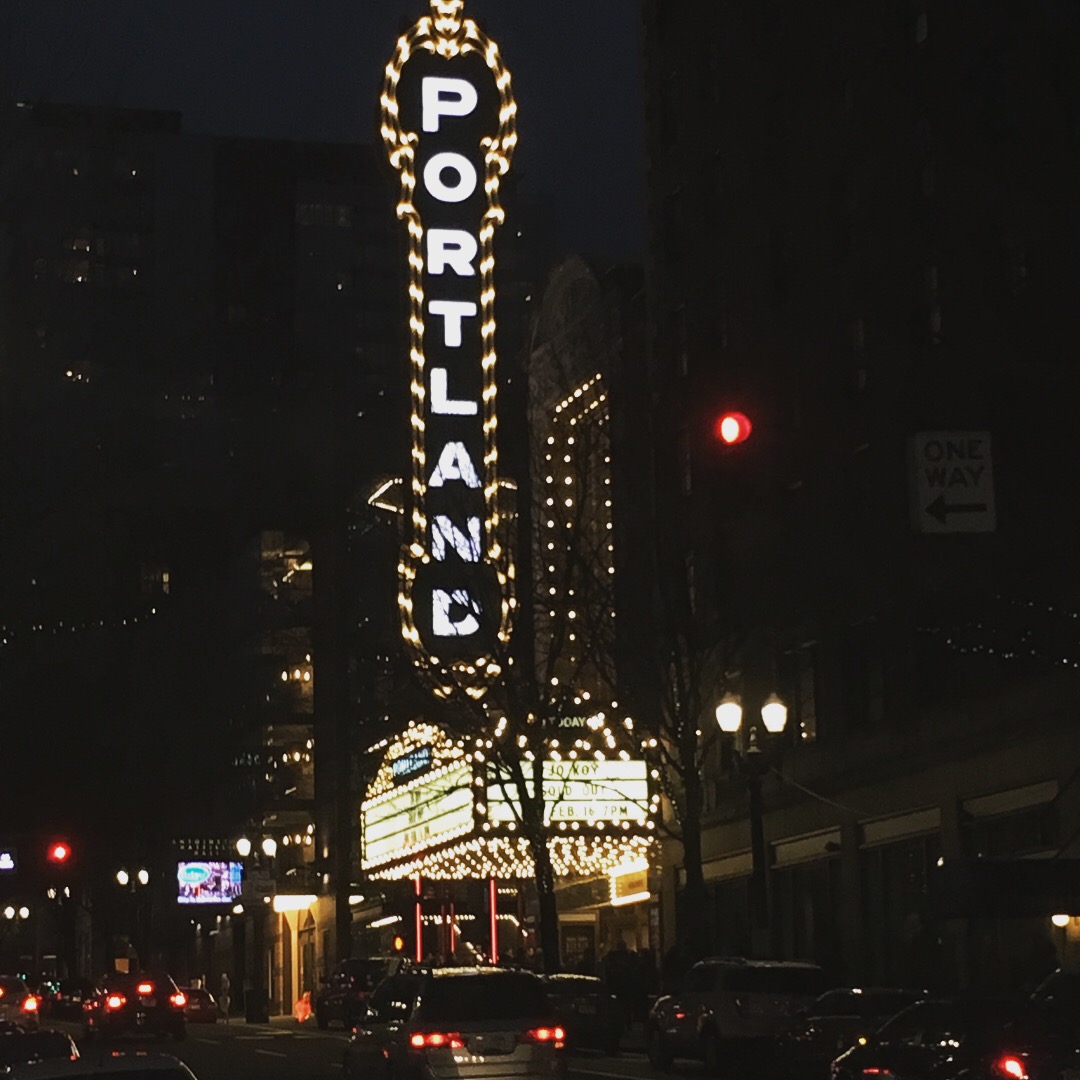Ocean Sciences: 2018 Portland Oregon
Chelsey Baker
NOC, Southampton
I was awarded a travel grant by the Challenger Society to attend the Ocean Sciences 2018 conference in Portland, Oregon. This was the first international conference I have attended with over 5000 attendees and more than 400 sessions.
On Sunday, before the official kick off of the conference, I attended a Science Communication workshop run by an actor and improv instructor. The workshop was interactive and helped develop our skills of forming a narrative and understanding the art of continuing a discussion using "Yes and" . It was a very fun session that pushed everyone outside of their comfort zone and was a great way to start the conference.
On Monday I attended the first of many sessions on the Biological Carbon Pump and presented my PhD research during the poster session. My research focuses on deep ocean particle flux in the Iceland Basin and how upper ocean mesoscale processes may exhibit some control on the material that reaches the deep ocean. I enjoyed presenting my poster, and had many interesting conversations about my work, which generated new ideas and areas to further explore. Attending the conference also allowed me to meet a co-author in person and discuss my PhD research face-to-face.  The conference passed in a busy and exciting blur of talks, networking at poster sessions and exploring Portland in the evening. One of the standout moments were the plenary talks on Tuesday by Prof. Claudia R Benitez-Nelson and Prof. John Dabiri. Claudia gave the most engaging research talk I’ve ever seen, with a strong narrative discussing Phosphorus cycling that really connected with the audience. John then followed with another inspiring talk full of amazing videos of swimming animals demonstrating how much energy they contribute to ocean mixing and his rapid career path to Professorship was very impressive. I definitely felt inspired and raring to get back to my PhD after those talks.
The conference passed in a busy and exciting blur of talks, networking at poster sessions and exploring Portland in the evening. One of the standout moments were the plenary talks on Tuesday by Prof. Claudia R Benitez-Nelson and Prof. John Dabiri. Claudia gave the most engaging research talk I’ve ever seen, with a strong narrative discussing Phosphorus cycling that really connected with the audience. John then followed with another inspiring talk full of amazing videos of swimming animals demonstrating how much energy they contribute to ocean mixing and his rapid career path to Professorship was very impressive. I definitely felt inspired and raring to get back to my PhD after those talks.
I would like to thank the Challenger Society for awarding me this travel grant that allowed me to attend this conference, learn about new research in my field and network within the wider oceanography community. It also allowed me to catch up with my peers who live all around the world and even to spend Wednesday evening watching the Portland Trailblazers win an NBA game. I’m glad that Ocean Science 2018 was the first international conference I attended as it was a truly amazing experience and I left feeling inspired, motivated and very grateful for the opportunity.
Profile: Chelsey Baker is a 3rd year PhD student at the National Oceanography Centre in Southampton researching the biological carbon pump. Chelsey is currently undertaking a research placement at Woods Hole Oceanographic Institute.
Twitter post: A blog post about Ocean Sciences 2018 – my first international conference by @ChelseyABaker #OSM18
Latest News
Royal Society Publishing Photography Competition 2025
Please see a message from the Royal Society below:
We are delighted to announce that the 2025 Competition is now open for entries until 15 August for a chance to win £1000! The competition celebrates the power of photography in conveying the wonder of science happening all around us and photographs can be submitted in the categories of: Astronomy, Behaviour, Earth Science and Climatology, Ecology and Environmental Science, and Microimaging.
The competition is free to enter and open to anyone studying or working in science at graduate level or above. Category winners will receive a one-year membership to the Royal Photographic Society and the overall winner will receive a grand prize of £1,000. Find out more: https://bit.ly/RSPphotocomp
October 2025 MEDIN Workshop: Marine Data Management, Governance and the MEDIN toolset
The Marine Environmental Data and Information Network (MEDIN) are pleased to announce that registration is now open for the next occurrence of our popular free online training workshop: ‘Marine Data Management, Governance and the MEDIN toolset’ on the 13th – 17th October 2025 on OceanTeacher Global Academy.
Marine Data Management, Governance and the MEDIN toolset
The Marine Environmental Data and Information Network (MEDIN) and OceanWise are delighted to invite you to attend our popular free online training workshop: ‘Marine Data Management, Governance and the MEDIN toolset’ on the 19th – 23rd of May 2025.

